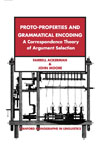

|
|
|
|

Proto-properties and Grammatical EncodingA Correspondence Theory of Argument Selection This book develops a theory of semantically induced argument encodings based on the proto-property argument selection proposal of David Dowty. Such a theory is designed to cover much of the empirical terrain of mapping/linking theories in identifying the principles of correspondence between the lexical semantics of predicates and the grammatical function and morphological case encodings of their arguments. In this theory the authors distinguish two basic strategies for the organization of lexical information: a syntagmatic argument selection principle, which, following Dowty's work, compares the proto-properties of co-arguments of a single predicate, and a paradigmatic argument selection principle, which compares the proto-properties of a single argument across related predicates. They demonstrate how these two strategies yield widespread cross-linguistic patterns of regularity with respect to the correspondence between lexical information and argument encoding. In particular, Ackerman and Moore consider psych predicates, causatives, object encoding in Estonian and Finnish, and experiencer constructions in Polish and Russian. Read an excerpt from this book. and are associate professors of linguistics at the University of California, San Diego. Contents
8/1/2001 ISBN (Paperback): 1575861666 (9781575861661)
Subject: Grammar; Semantics |
Distributed by the
University of Chicago Press |
|
pubs @ csli.stanford.edu
|
CSLI Publications
Stanford University Cordura Hall 210 Panama Street Stanford, CA 94305-4101 (650) 723-1839 |